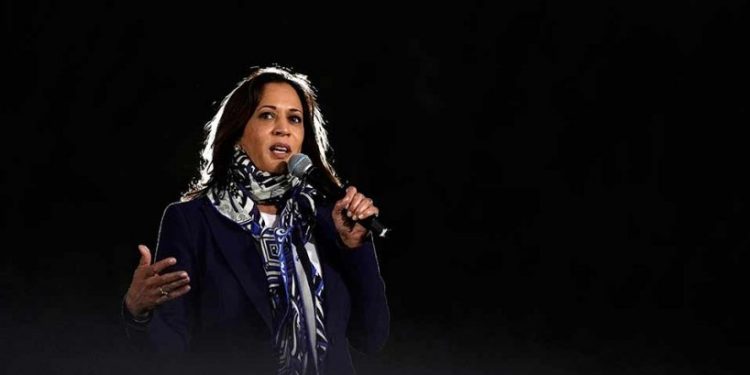If you add “la” ~ the French feminine of the equivalent of the English article ‘the’ to “comma”, the combination makes the US Vice President-elect! This is how Kamala Harris’ campaign itself sought to guide the Americans how to pronounce her name correctly after President Donald Trump taunted her by pronouncing her name in a mocking, bizarre way to denigrate her before his supporters at election rallies. Thousands of supporters of President-elect Biden’s running mate wore T-shirts on which was embossed this “guidance” in response to the male chauvinism bordering on racism that Trump and his followers laced their campaign with.
Trump made a point of deliberately mispronouncing Harris’ name: “By the way, Ka-MAHH-lahh will not be your first female president,” he said, stretching out the second and third syllables like a taunt, to the crowd of jeering supporters. Many other key campaigners of Trump continued their Harris-bashing in the same vein. Georgia Sen. David Perdue opened his speech at a rally with these words: “KAH’-mah-lah? Kah-MAH’-lah? Kamala-mala-mala? I don’t know. Whatever.” The crowd roared with laughter.
This is the climate of gender or racial discrimination and hatred that characterised the Trump Presidency and Kamala Harris’ historic elevation to the position of Vice President-elect is, in a way, being viewed not only as a triumph of woman power, but also gender equality. In fact, her victory comes at a time when women leaders are emerging as equal partners in shaping the destiny of many countries. Only a few weeks back, New Zealand’s newly elected Prime Minister Jacinda Ardern appointed the country’s first indigenous female foreign minister Nanaia Mahuta. She is a Maori and she wears with pride a “moko kauae”, a traditional tattoo, on her chin just as Harris prides herself in the correct pronunciation of her name.
Ardern’s parliament looks set to be one of the most diverse in the world. Almost half of that country’s lawmakers will be women and significantly higher than the global average of 25 per cent.
Iceland has already hit global headlines with the Cabinet of Prime Minister Katrín Jakobsdóttir comprising five women against six men, making it the second-most gender-balanced cabinet in Icelandic history.
The misogynist stand of Trump as exhibited in his deliberate distortion of pronunciation of Kamala Harris’ name triggered a flurry of protest by women in the USA, reports Los Angeles Times. Hundreds of people responded, many recounting their own experiences with unusual names in schools and in the workforce. “It built a nice core of anger that erupts when I see stuff like this and makes me see red,” wrote Irvine resident, Dan Chiappe, 53. The Peruvian native’s birth name is Danilo Chiappe, pronounced Dah-KNEE-low Kee-YAHP-eh.
“It’s not just a word. It’s your name,” said Danilo Chiappe, a psychology professor, stating further that “Your name is an intrinsic part of your identity.”
The Narendra Modi-government is now veering round to the normal diplomatic trajectory of congratulating the President-elect and Vice President-elect of the USA.
BJP leaders saw the Indian origin of Kamala Harris as a window of opportunity to make amends for Modi’s open support to Trump and strengthen Indo-US relations under the Biden dispensation.
PM Modi tweeted: “Heartiest congratulations @KamalaHarris! Your success is pathbreaking, and a matter of immense pride not just for your chittis, but also for all Indian-Americans. I am confident that the vibrant India-US ties will get even stronger with your support and leadership.”
Unfortunately for India’s leaders, Kamala considers herself more Black than Indian. She was born in the US, her father was Jamaican and mother Indian, married to an American and certainly considers herself a pure bred American. It is quite childish to assume that Kamala would have any feelings for India or Indians. It is important that Indians do not get misled into thinking she will, in any manner, be pro India.
The truth is that the Democrats are highly critical of the Modi government’s bifurcation of Kashmir and the abrogation of Article 370. Earlier in October 2019, Kamala Harris said in response to a question on human rights violation in Kashmir and restrictions imposed, including curfews and communication blackout : “We have to remind the Kashmiris that they are not alone in the world. We are keeping a track on the situation. There is a need to intervene if the situation demands.”
She also stood by fellow Indian-origin Congresswoman Pramila Jayapal when External Affairs Minister S Jaishankar refused to attend a meeting in the US over her participation. Jayapal had earlier moved a resolution on the Kashmir issue in the House of Representatives. Now the situation may get even more precarious since the role played by PM Modi during Trump’s campaign is getting highlighted.






































